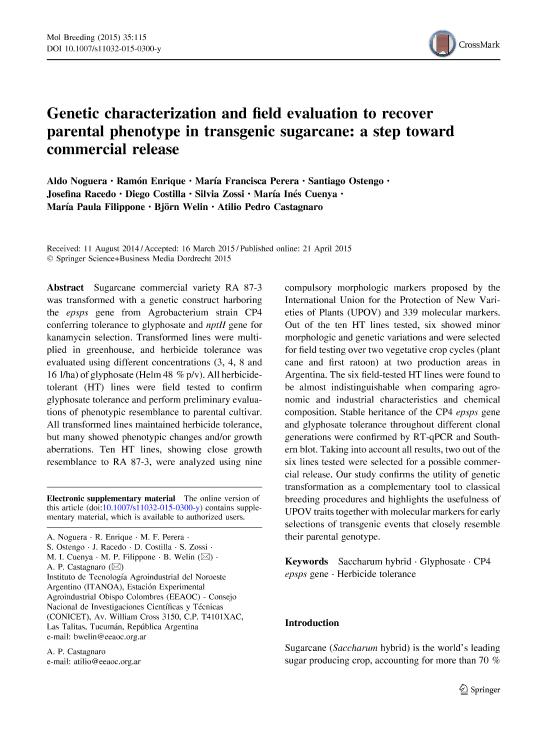Artículo
Genetic characterization and field evaluation to recover parental phenotype in transgenic sugarcane: a step toward commercial release
Noguera, Aldo; Enrique, Ramón Atanasio ; Perera, María Francisca
; Perera, María Francisca ; Ostengo, Santiago; Racedo, Josefina
; Ostengo, Santiago; Racedo, Josefina ; Costilla, Diego; Zossi, Silvia; Cuenya, María Inés
; Costilla, Diego; Zossi, Silvia; Cuenya, María Inés ; Filippone, María Paula
; Filippone, María Paula ; Welin, Bjorn
; Welin, Bjorn ; Castagnaro, Atilio Pedro
; Castagnaro, Atilio Pedro
 ; Perera, María Francisca
; Perera, María Francisca ; Ostengo, Santiago; Racedo, Josefina
; Ostengo, Santiago; Racedo, Josefina ; Costilla, Diego; Zossi, Silvia; Cuenya, María Inés
; Costilla, Diego; Zossi, Silvia; Cuenya, María Inés ; Filippone, María Paula
; Filippone, María Paula ; Welin, Bjorn
; Welin, Bjorn ; Castagnaro, Atilio Pedro
; Castagnaro, Atilio Pedro
Fecha de publicación:
05/2015
Editorial:
Springer
Revista:
Molecular Breeding
ISSN:
1380-3743
e-ISSN:
1572-9788
Idioma:
Inglés
Tipo de recurso:
Artículo publicado
Clasificación temática:
Resumen
Sugarcane commercial variety RA 87-3 was transformed with a genetic construct harboring the epsps gene from Agrobacterium strain CP4 conferring tolerance to glyphosate and nptII gene for kanamycin selection. Transformed lines were multiplied in greenhouse, and herbicide tolerance was evaluated using different concentrations (3, 4, 8 and 16 l/ha) of glyphosate (Helm 48 % p/v). All herbicide-tolerant (HT) lines were field tested to confirm glyphosate tolerance and perform preliminary evaluations of phenotypic resemblance to parental cultivar. All transformed lines maintained herbicide tolerance, but many showed phenotypic changes and/or growth aberrations. Ten HT lines, showing close growth resemblance to RA 87-3, were analyzed using nine compulsory morphologic markers proposed by the International Union for the Protection of New Varieties of Plants (UPOV) and 339 molecular markers. Out of the ten HT lines tested, six showed minor morphologic and genetic variations and were selected for field testing over two vegetative crop cycles (plant cane and first ratoon) at two production areas in Argentina. The six field-tested HT lines were found to be almost indistinguishable when comparing agronomic and industrial characteristics and chemical composition. Stable heritance of the CP4 epsps gene and glyphosate tolerance throughout different clonal generations were confirmed by RT-qPCR and Southern blot. Taking into account all results, two out of the six lines tested were selected for a possible commercial release. Our study confirms the utility of genetic transformation as a complementary tool to classical breeding procedures and highlights the usefulness of UPOV traits together with molecular markers for early selections of transgenic events that closely resemble their parental genotype.
Palabras clave:
Saccharum Hybrid
,
Glyphosate
,
Cp4 Epsps Gene
,
Herbicide Tolerance
Archivos asociados
Licencia
Identificadores
Colecciones
Articulos(CCT - NOA SUR)
Articulos de CTRO.CIENTIFICO TECNOL.CONICET - NOA SUR
Articulos de CTRO.CIENTIFICO TECNOL.CONICET - NOA SUR
Citación
Noguera, Aldo; Enrique, Ramón Atanasio; Perera, María Francisca; Ostengo, Santiago; Racedo, Josefina; et al.; Genetic characterization and field evaluation to recover parental phenotype in transgenic sugarcane: a step toward commercial release; Springer; Molecular Breeding; 35; 115; 5-2015; 1-15
Compartir
Altmétricas



